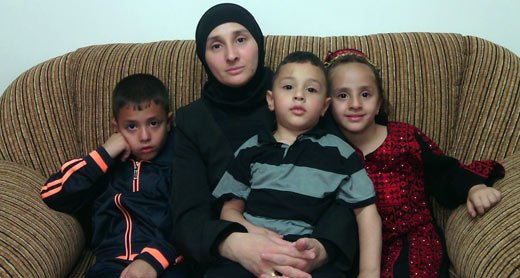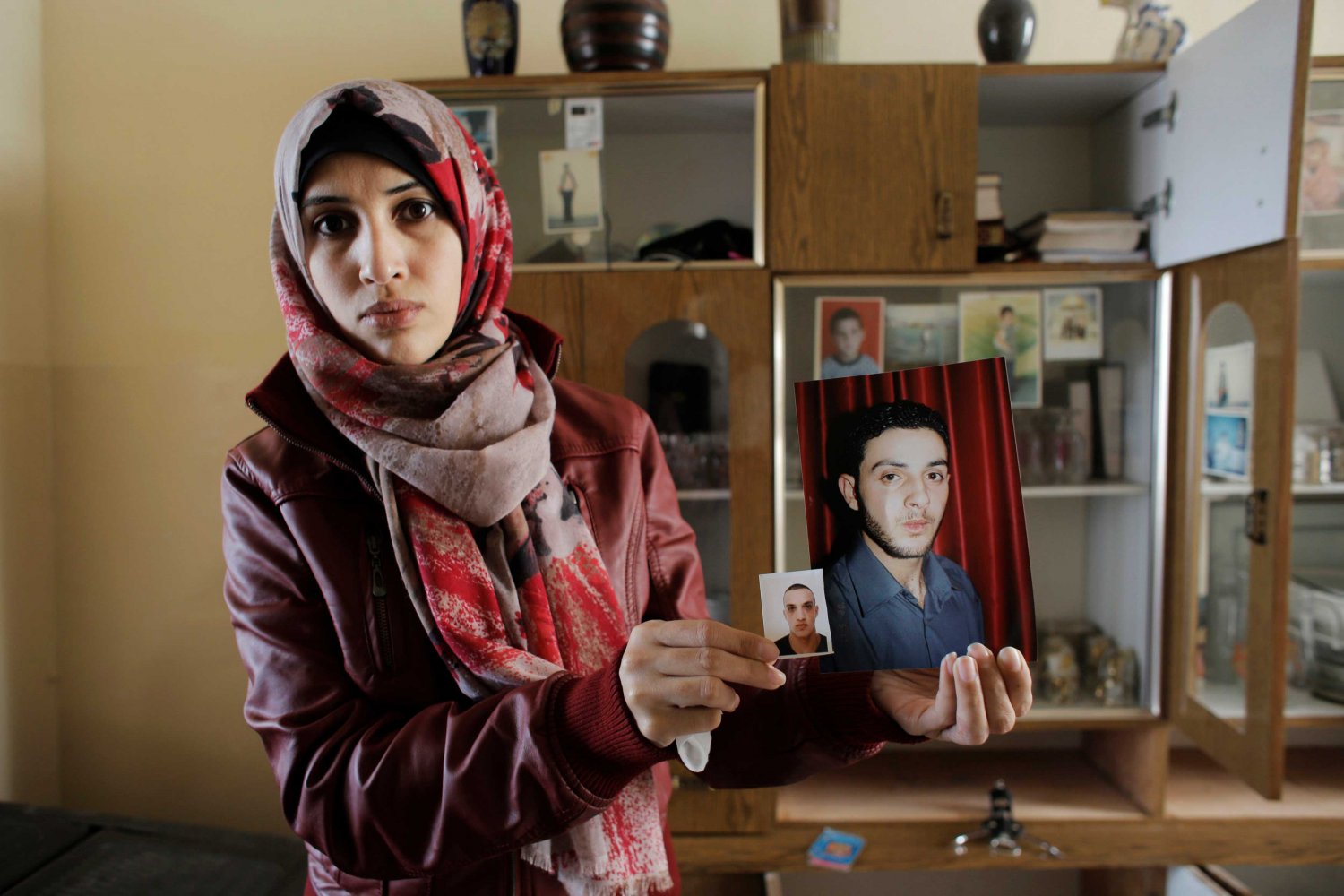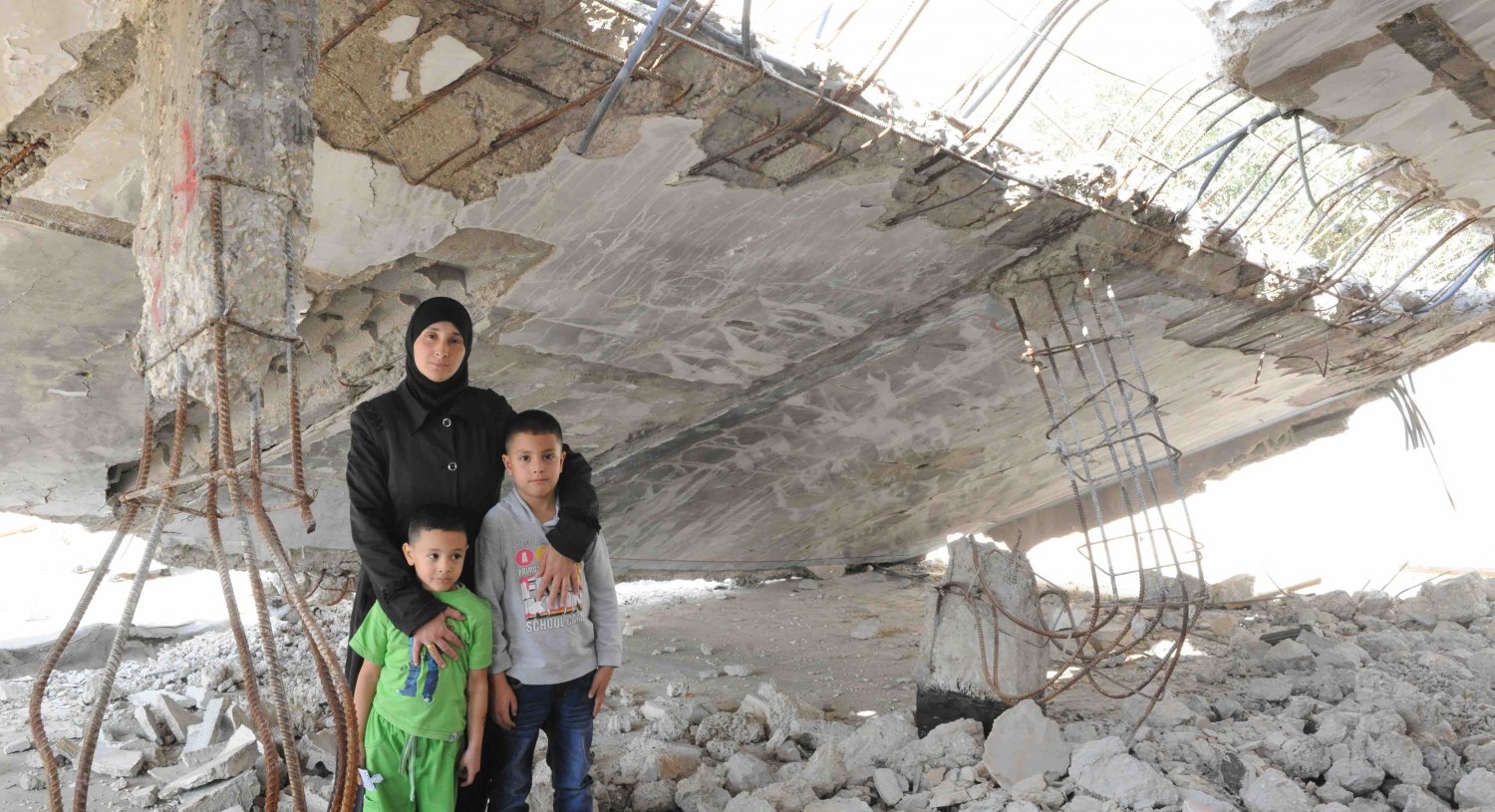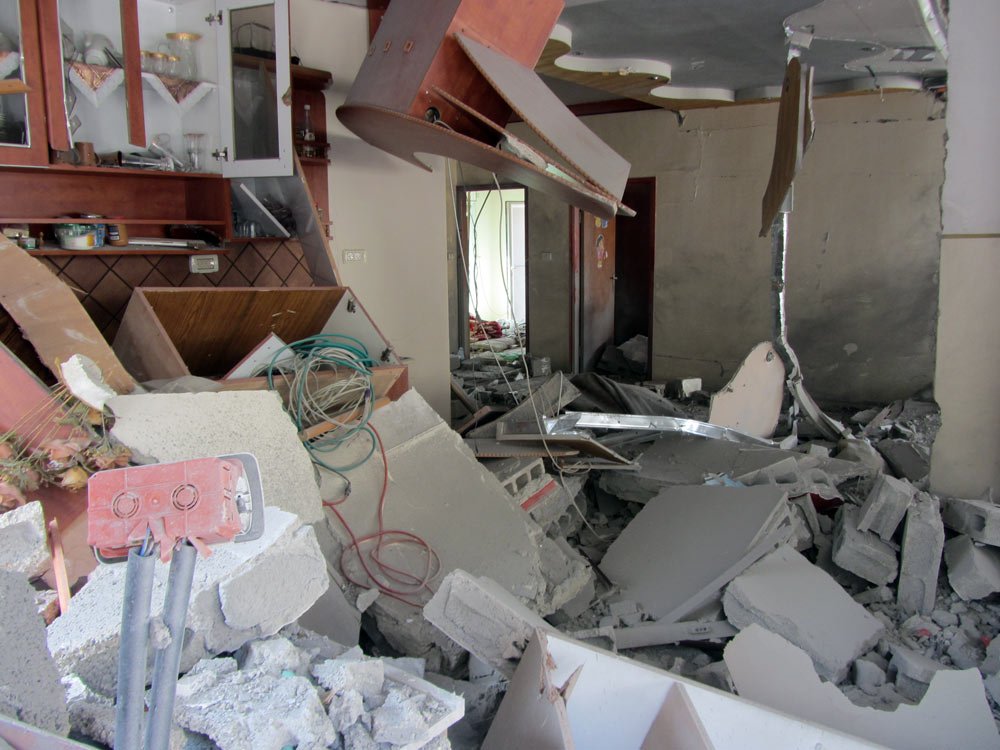Nadia Abu Jamal, 37, was born and raised in al-Sawahira al-Sharqiyya in the occupied West Bank and holds a Palestinian Authority (PA) ID (green ID). To begin to understand her story and her situation, some background is in order first.
Forcibly Displaced for a Spouse’s Acts: The Case of Nadia Abu Jamal and Her Three Children
Snapshot
When a Palestinian is accused of a “security” crime (i.e., an attack against a Jew that is presumed to be perpetrated on a nationalistic or political basis), Israel collectively punishes the entire family in a variety of ways. The case of Nadia Abu Jamal and her three children exemplifies two such retaliation polices, punitive residency revocation and punitive home demolition.
Historical Background
The Palestinian Bedouin community of Arab al-Sawahira is located southwest of the Old City of Jerusalem. Arab al-Sawahira is known for the close ties and relationships between community members, who are all related to one another.
The distance between the center of this community and the center of the Old City is approximately 6.3 km. Historically, Arab al-Sawahira was bordered on the east by the lands of the Nebi Musa site and the Dead Sea; on the north, by the village of Abu Dis; to the west, Beit Safafa and Sur Bahir; and from the south, the village of al-‘Ubaydiyya in the Bethlehem Governorate.
Arbitrary division
Shortly after Israel occupied the West Bank (including East Jerusalem) in 1967, the state unilaterally expanded the city boundaries of Jerusalem far beyond the city’s 1948 borders. In the process, the village in which the Palestinian Bedouin community of Arab al-Sawahira lived was arbitrarily split in two:
Al-Sawahira al-Gharbiyya (“Western al-Sawahira”), including the Palestinian neighborhood of Jabal Mukabbir, became part of the newly enlarged city of Jerusalem; Israel extended its law, jurisdiction, and administration over it (see Where Is Jerusalem?).
After occupying and dividing the village, Israel conducted a census in the parts that fell within its newly expanded Jerusalem municipal boundaries. Palestinians who were present at the time of the census and were living in al-Sawahira al-Gharbiyya, including Jabal Mukabbir, were generally granted the status of Israeli permanent resident (see Precarious, Not Permanent: The Status Held by Palestinian Jerusalemites), while those who were living in al-Sawahira al-Sharqiyya, including Sheikh Sa‘d, were issued West Bank IDs (which after the signing of the Oslo Accords in 1995 became PA IDs). Neither group had any choice in the ID to which it was assigned.
As a result, the village was divided, not only territorially but also sociopolitically, between two different categories of people living under different ruling systems: the first, part of Israel with the limited (but revocable) rights afforded to permanent residents; the second, part of the occupied West Bank with few or no rights at the time.
Orange versus green IDs
At the time of the census, in 1967, the West Bank IDs were orange and were issued by the Israeli military government of the West Bank in 1967. In 1981, this body was renamed the Israeli Civil Administration. Later, the Civil Administration became part of the Coordinator of Government Activities in the Territories (COGAT). The COGAT is a unit in the Israeli Ministry of Defense.
After the Oslo Accords were signed, the Palestinian Authority took over the administrative responsibility for issuing IDs to Palestinians living in the West Bank, which became green. Authority over approval for IDs remained with the COGAT.
Nadia’s Story
Nadia Abu Jamal, 37, was born and raised in al-Sawahira al-Sharqiyya and holds a Palestinian Authority ID (green ID). In 2002, she married Ghassan Abu Jamal, who was born in Jabal Mukabbir (al-Sawahira al-Gharbiyya) and held an Israeli permanent-resident ID (blue ID).
In 2000, Israel put on hold the family unification process, meaning that Ghassan could not even apply for Israeli permanent-resident status for his wife. In 2003, the family unification freeze was made permanent by law.1 As a result, all Palestinians holding green IDs could no longer get Israeli permanent residency through their spouses; without it, they are in violation of Israeli law if they live with their spouses in Jerusalem.
After a long legal battle waged by many human rights organizations, Palestinians with green IDs married to Palestinians with blue IDs were allowed to receive something called a “stay permit.” This permit allows green ID holders to live with their spouses inside the Israeli municipal boundaries of Jerusalem for one year. The permit must be renewed annually.2
Nadia and Ghassan have three children; their ages at the time of this writing are: Waleed, 12; Salam, 10; and Muhammad, 9. All three children were born in Jerusalem and had lived there for their entire lives. The three children were eligible for, and received, Israeli permanent-resident status through their father, although they were not yet of an age to have their own IDs. According to Israeli law, this status entitles them to social rights, including health care. Two of the children suffer from chronic conditions for which they require regular medical attention. The youngest son suffers from a neurological disorder, and the oldest son was born with heart failure.3
The Climate in Jerusalem at the Time
Early on the morning of July 2, 2014, during the month of Ramadan, Mohammed Abu Khdeir, a 16-year-old Palestinian Jerusalemite, was forced into a car by Israeli settlers as he was walking to his home in the Shu‘fat neighborhood of East Jerusalem. Abu Khdeir was burned alive and buried in a wooded area, almost 7.4 km away from his home. He was killed in an act of revenge for the kidnapping and murder of three Jewish teens several weeks earlier.4
Abu Khdeir’s kidnapping and murder sparked massive Palestinian protests. In the aftermath, Prime Minister Netanyahu decided to resume the practice of home demolitions as collective punishment for Palestinians who commit crimes on a “security basis,” a practice that had been more or less suspended since 2005, when a military panel found it was more likely to promote hatred than deterrence.
The Attack
On November 18, 2014, Ghassan and his cousin Uday, both in their twenties, entered a synagogue in the ultra-Orthodox Har Nof neighborhood in West Jerusalem shortly before 7 a.m. as worshippers were attending prayers. Carrying axes, knives, and a pistol, they killed four rabbis and injured a fifth person, an Israeli Druze police officer, who later died from his wounds.5 Seven other people were wounded. Both cousins were killed by police responding to the scene. Neither had ever been arrested, nor did they share any reasons for their actions.
Immediate Payback; Domino Consequences
After the attack was announced in the media but before the perpetrators’ names were revealed, the Israeli Border Police broke into Nadia and Ghassan’s house in Jabal Mukabbir and arrested her in front of her children. She was taken first to a nearby police station. She then was transferred to al-Moskobiyya interrogation center.
Nadia later described her ordeal to a human rights organization: “The first thing the Israeli interrogator did was to revoke my stay permit in Jerusalem. They broke into my house, arrested me, and revoked my residency to threaten me and to force me to confess that I was aware of my husband’s intentions and collaborated with him in his plans. I rejected all accusations.”6
The Ministry of Interior immediately officially revoked Nadia’s stay permit, rendering her illegal in the city. Nadia also received a “deportation”7 order to leave Jerusalem and to return to al-Sawahira al-Sharqiyya, which, as noted above, is part of the occupied West Bank.
When Nadia took one of her children to the doctor, she was surprised to be told he had no health insurance. An investigation by the Israeli human rights organization HaMoked determined that all three children’s names were deleted from the health insurance database the day after the synagogue attack,8 leaving them without affordable access to medical care despite their chronic conditions.
Uday’s family was likewise ejected from their home, which was then punitively “sealed,” “which means filled with cement up to the light fixtures”9 and welded shut with iron bars across the doors and windows.10
Violation of International Law
As an occupying power, under international humanitarian law and international human rights law, Israel has an overall responsibility for the protection of Palestinian civilians in Jerusalem, including the provision of and access to health care. Accordingly, these actions violated international law. Revoking health care insurance effectively means that Nadia’s children cannot access health care services in Jerusalem; but there are no equivalent services in the occupied West Bank (see Only in Jerusalem). Without insurance, they will be forced to pay in full for private health care of a lower standard; like many Palestinian Jerusalemites, they cannot afford to do so.
Beginning on November 18 and through December 2014, the Israeli Border Police repeatedly broke into Nadia’s home in al-Sawahira al-Gharbiyya, causing damage and issuing threats. They took measurements, demolished internal walls, and threatened that they would soon demolish the family home. On December 31, they issued Nadia a home demolition order.
High Court Finds the Deportation Order Legal
On November 30, 2014, HaMoked filed a petition against Nadia's forcible transfer with the Israeli High Court of Justice (HCJ). On July 22, 2015, the HCJ (decision 813/14) rejected the petition, ruling that the deportation order was legal. HaMoked asserted that the court’s decision was “a deliberate act of revenge against the woman and her children for a crime they had not committed.”11
On October 6, 2015, Israel punitively demolished Nadia and Ghassan’s home, displacing Nadia and her children. The blast was so strong that it also destroyed an adjacent apartment where Ghassan’s older brother, Muawiya, lived with his wife and three children.12 This occurred despite the fact that the court had explicitly ordered that adjacent apartments be left intact. In all, 23 people lived in the building where Ghassan and Nadia’s apartment was located. (Muawiya was also blacklisted due to Ghassan’s actions, so he could not work and had to depend on his family.)
Nadia and her children moved into Ghassan’s parents’ home in Jabal Mukabbir (inside the Israeli municipal boundaries) and stayed there for about 15 months.
During the early hours of January 17, 2017, the Israeli Border Police broke into Nadia’s in-laws’ house and arrested and forcibly deported her from the city of Jerusalem. If she is caught within the boundaries of Jerusalem, she will face a six-month imprisonment.
The children were then aged 8, 6, and 5. Although they had legal residency status at the time through their father, and they were born and lived their entire lives in Jerusalem, their mother could not leave them behind, particularly considering they had lost their father their home, and she was not ever to be allowed to enter the city again. So effectively the children were forced to move outside the city boundaries with her.
Effect on the Children
Nadia eventually moved with her three children to al-‘Izariyya, which is outside of the Israeli Jerusalem municipal borders and considered part of the PA territory.
In a video interview with a human rights organization in February 2017, Nadia shared:
Muhammad suffers from neurological problems, so when he becomes nervous, he starts to vomit. Walid was born with heart problems.
Of course, after suffering from all these things, they became extremely mentally and emotionally distressed. Their aunt took them to a psychiatrist as she is a counselor. When his father was killed, my older son Walid was under six years old; he started staying up until 2 a.m. and waking up at 5 a.m. He would not eat. He would play with fire and burn himself, but he would say he did not feel anything. As for Salma and Muhammad, my younger son, they began wetting the bed, which they had never done previously. They also became extremely nervous and aggressive; they did not want to see anyone. They became introverted and unsociable; they did not want to go to school.13
Beyond Stateless
Because the children moved with their mother out of Jerusalem, their legal status as Jerusalem residents has been revoked, but they cannot obtain status as West Bankers either, because although this is administratively issued through the PA, the Israeli COGAT has to approve every decision. As a result, they are now stateless. They do not have legal status or any rights in Jerusalem, the rest of the West Bank, or anywhere else. Not having a legal residency status means:
- They have no access to social services. Although most Palestinian residents of Jerusalem do not have an adequate standard of living or affordable and adequate housing, they do have access to some level of health care and education, even if not at the level that Jewish residents enjoy. Nadia and her children have no access to health care and education in Jerusalem or overseas if they wish to purse their education abroad. They have access to the education system and some social benefits under humanitarian reasons from the PA in the West Bank, but this is not automatic; they will need to go through a long process and to explain their situation repeatedly.
- Nadia’s three children are unable to leave the neighborhood they live in, because without any identity cards, they will not be able to pass any of the many permanent (and “flying”) Israeli checkpoints that control Palestinian movement.
- When they come of age, they will not be able to get driving licenses.
- Needless to say, without any form of identification, travel outside of the country is also out of the question; even within the country, their movement is severely constrained.
- When the children get older, Palestinian universities will be inaccessible to them. They would have to pass Israeli military checkpoints to get to them, and without ID cards, they will not be able to do that.
- Job opportunities for Nadia’s children when they grow up will be slim to nonexistent, because no one can get a job without some type of official ID.
Thus, in this case, as in other similar cases, Israel ensures that the actions of one family member effectively destroy the lives and futures of all other immediately family members, although they had nothing whatsoever to do with the attack, nor even any advance knowledge that it would occur. In this case, the perpetrator paid with his life, but his family, including three minor children, is punished interminably, long after his death.
Notes
“Knesset Approves of the Citizenship and Entry into Israel Law (temporary provision) 5763 – 2003,” The State of Israel Knesset, news release, July 31, 2003.
“The Case of Nadia Abu Jamal and Her family,” Al-Haq, February 9, 2014.
Lizzie Dearden, “Mohammed Abu Khdeir Murder: Israeli Man Convicted of Burning Palestinian Teenager to Death in Revenge Killing,” Independent, April 19, 2016.
“Israel/Palestine: 5 Dead in Synagogue Attack, Armed Group Claims Responsibility,” Human Rights Watch, November 19, 2014.
“The Case of Nadia Abu Jamal and Her Family.”
Although official documents use this term, the actions of the state with respect to Nadia Abu Jamal qualify more as forcible transfer. According to international law, because East Jerusalem is occupied territory, all Palestinian Jerusalemites are protected persons. The revocation of residency rights and deportation from occupied East Jerusalem to another part of occupied Palestinian territory therefore constitutes forcible transfer. Forcible transfer of protected persons from their communities is a serious violation of international human rights and humanitarian law.
Amnesty International, “Urgent Action: Palestinian Residency Revoked as Punishment,” December 17, 2014.
Ruth Eglash, “Israel Steps Up Home Demolitions to Punish Palestinian Attackers,” Washington Post, January 17, 2016.
Avi Lewis and Avi Issacharoff, “Israel Seals Jerusalem Home of Terrorist’s Family,” Times of Israel, July 1, 2015.
Ben Lynfield, “Ghassan Abu Jamal: Israel Demolishes Family Home of Man behind Deadly Jerusalem Synagogue Attack,” Independent, October 6, 2015.
“The Case of Nadia Abu Jamal and Her Family.”




